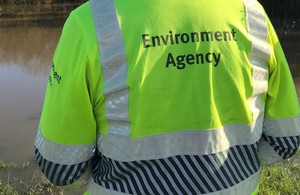Waste holder fined £5,000 for failing in duty of care
Press release
A Barnsley landowner faces financial penalties of over £5,000 after failing to comply with an Environment Agency notice to keep and serve Waste Transfer Notes.

Environment Agency Officers served a statutory notice on Carla Hardwick of Barnsley Road, Brierley. Following an investigation into fly-tipping in a layby at Windmill Hill on the A17 near Sleaford, Lincolnshire.
The notice required her to hand over paperwork supporting the transfer of waste from her land in Carlton, Barnsley, South Yorkshire. Officers attended the site in October 2020 and gave Ms Hardwick advice on the actions she needed to take. These included the removal of excess waste and the importance of retaining relevant Waste Transfer Notes for waste that had been removed.
When officers returned to the site in June 2021, they noted that the vast majority of the waste had gone. However, when asked to provide the Waste Transfer Notes, she failed to provide any documents in respect of the waste removed. The transfer notes were requested for between the dates of the Environment Agency visits. After 12 months she did provide a single document, but this did not match the waste on her site. It did not provide the information legally required by a transfer note. In particular it did not identify the person removing the waste.
The court heard that Ms Hardwick had no system for recording waste movements from her site. This leaves waste vulnerable to the risk of fly-tipping and made it impossible for the Environment Agency to trace its movements, once it had left her site.
Ordering Ms Hardwick to pay a fine of £729, costs of £4,579 and a victim surcharge of £72. The presiding magistrate said that she had acted “recklessly” and had “ample opportunity to comply with her obligations.”
After the hearing, Environment Officer Paul Salter said:
Waste crime undermines legitimate business, can cause harm to the environment and to local communities. This case demonstrates the importance of businesses and individuals following the rules when handling waste.
There was no suggestion that Ms Hardwick had fly-tipped any waste herself but that she had lost control of the waste leaving her site. When waste is illegally disposed of the waste transfer notes enable us to trace the waste. Where the rules aren’t followed, we cannot identify offenders, meaning that they get away with it and are likely to commit further offences.
Anyone with information about waste crime to contact the Environment Agency’s hotline on 0800 80 70 60 or anonymously to Crimestoppers on 0800 555 111.
Ends
Published 24 October 2022

